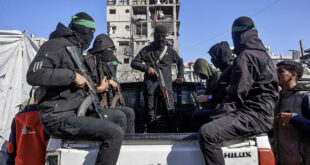Azerbaijani President Ilham Aliyev says his troops have taken control of the first of three districts bordering Nagorno-Karabakh as part of a Russian-brokered peace agreement that ended a six-week war with Armenian forces over the breakaway region.
The Azerbaijani Defense Ministry said on November 20 that its units entered the Agdam district, one of three ringing Nagorno-Karabakh that are to be handed over to Azerbaijan after nearly three decades under Armenian control.
Crowds of people carrying national flags gathered in the Azerbaijani capital, Baku, to celebrate the handover of Agdam as Aliyev announced “major” plans for the district.
The chief of staff of the Russian peacekeeping task force in Nagorno-Karabakh said the handover operation was carried out without incident.
As Azerbaijani troops moved into Agdam a day after columns of Armenian soldiers and tanks rolled out of the territory, Armenian Defense Minister Davit Tonoyan was fired by Prime Minister Nikol Pashinian.
Tonoyan, who had held the position since May 2018, was replaced by Vagharshak Harutunian.
Armenian villagers in Agdam were given just days to leave their homes, scrambling to pack their belongings into vehicles and emptying homes before setting structures on fire.
It is the latest exodus of Armenians as Azerbaijan reasserts control over its former territories under the peace deal brokered by Moscow that ended six weeks of intense fighting between the two South Caucasus neighbors.
The November 10 accord allows Azerbaijan to keep a sizable chunk of Nagorno-Karabakh captured during fighting as well as all areas ringing the mountainous enclave that had been under Armenian control.
In addition to Agdam, located east of Nagorno-Karabakh, Armenians must leave the western districts of Kalbacar on November 25 and Lachin by December 1. Baku captured four other districts during the conflict.
Under the deal, around 2,000 Russian peacekeepers will be deployed to maintain security in Nagorno-Karabakh, but critical final-status issues over the territory remain uncertain. Russian peacekeepers are also guarding the strategic Lachin Corridor, the sole road linking the region and Armenia.
Aleksandr Bortnikov, the head of Russia’s Federal Security Service (FSB), on November 20 said 188 servicemen as well as military hardware had been deployed to reinforce Russian border guards in Armenia.
The reinforcements are to be dispatched to the border between Armenia and Azerbaijan, Bortnikov told Russian President Vladimir Putin at a conference via video link, adding that the deployment was made at the request of Armenia.
Russia’s Border Guard Service is a branch of the FSB. Russian border guards are present in Armenia under the terms of a 1992 treaty between the two countries.
Nagorno-Karabakh is internationally recognized as part of Azerbaijan, but the ethnic Armenians who make up most of the population reject Azerbaijani rule.
They have been governing their own affairs, with support from Armenia, since Azerbaijan’s troops and ethnic Azeri civilians were pushed out of the region in a war that ended in a cease-fire in 1994.
Fighting broke out again in and around Nagorno-Karabakh on September 27, killing thousands of soldiers and civilians on both sides over the ensuing weeks. Azerbaijan has not provided a figure for its military casualties.
Russian President Vladimir Putin said after the peace accord was signed on November 10 that total fatalities that include civilians had surpassed 4,000 people.
The accord triggered a wave of fury in Armenia, where thousands of protesters took to the streets and stormed government buildings in the capital, Yerevan, calling Pashinian a “traitor” and demanding his resignation.
Pashinian has also dismissed his foreign minister during the turmoil, but has refused to cede to calls from protesters and opposition leaders to hand in his own resignation.
Harutunian, who is Pashinian’s defense adviser, previously served as defense minister from 1999-2000.
Despite Tonoyan’s removal, opposition activists seeking Pashinian’s resignation again blocked several streets in downtown Yerevan on November 20, chanting: “Nikol is a traitor! Nikol must go!”
Tens of thousands of ethnic Armenians were displaced in the fighting, putting economic, social, and political pressure on Armenia and authorities in Nagorno-Karabakh.
 Eurasia Press & News
Eurasia Press & News



